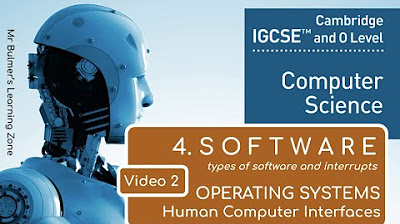Operating System Services
Summary
TLDRThis lecture delves into the critical services provided by operating systems, emphasizing the user interface, including CLI and GUI, and the essential functions of program execution, I/O operations, file system management, inter-process communication, error detection and correction, resource allocation, accounting, and robust protection and security measures. It highlights the operating system's role in managing computer resources efficiently and securely, ensuring smooth and consistent computing experiences.
Takeaways
- 🖥️ The operating system (OS) provides a user interface, which can be a command-line interface (CLI) or graphical user interface (GUI), to facilitate user interaction.
- 🔧 The OS is essential for program execution, loading programs into memory, and running them.
- 🔄 The OS manages input/output (I/O) operations, controlling the use of I/O devices by the user and programs.
- 📁 File system manipulation is a key service of the OS, including creating, deleting, modifying, and searching for files, along with managing file permissions.
- 💬 Communication is facilitated by the OS between processes, which can be on the same or different computers, to synchronize and efficiently execute tasks.
- 🛡️ Error detection and handling are critical OS services to ensure consistent computing, even when errors such as hardware malfunctions occur.
- 📊 Resource allocation is performed by the OS to assign CPU, memory, files, and I/O devices to processes in an efficient manner.
- 🔒 Protection and security services of the OS ensure that processes do not interfere with each other and that the system is secure from unauthorized access.
- 📊 Accounting is used by the OS to track resource usage by users, which can help in system reconfiguration and improving computing services.
- 🔒 The OS implements protection and security measures to safeguard the system from external threats and to record invalid access attempts.
- 🗂️ A recap of OS services includes user interface, program execution, I/O operation, file system manipulation, communication, error detection, resource allocation, accounting, protection, and security.
Q & A
What are the primary services provided by an operating system?
-The primary services provided by an operating system include user interface, program execution, I/O operations, file system manipulation, communication, error detection, resource allocation, accounting, and protection and security.
What is the user interface and why is it important?
-The user interface is a service that allows users to interact with the operating system. It is important because it facilitates the interaction between the user and the system, and can take forms such as the command line interface (CLI) or the graphical user interface (GUI).
What are the two main types of user interfaces mentioned in the script?
-The two main types of user interfaces mentioned are the command line interface (CLI) and the graphical user interface (GUI).
How does the operating system facilitate program execution?
-The operating system facilitates program execution by loading the program into memory and running it, ensuring that the system can execute the software as intended.
What is I/O operation and why is it essential?
-I/O operation refers to input/output operations that a running program may require, involving files or input/output devices. It is essential because it allows the operating system to control the usage of these devices, ensuring that a user cannot directly control them without the system's mediation.
Can you explain the role of file system manipulation in an operating system?
-File system manipulation involves controlling how files and directories are managed, including creating, deleting, modifying, and searching for files. It also controls the permissions given to certain programs or users for accessing specific files, ensuring access restrictions are maintained.
What is communication in the context of operating systems?
-In the context of operating systems, communication refers to the exchange of information between processes, which may be executing on the same computer or different computers connected by a network. This allows processes to synchronize and execute efficiently.
Why is error detection important in operating systems?
-Error detection is important because it allows the operating system to be aware of and handle possible errors that can occur during computing. This ensures that the system does not break down completely and maintains consistent computing even when errors are encountered.
What does resource allocation involve in operating systems?
-Resource allocation in operating systems involves assigning resources such as CPU, files, I/O devices, and main memory to different processes and users. It is crucial for ensuring that all processes get the resources they need and that computing occurs efficiently.
What is the purpose of accounting in operating systems?
-The purpose of accounting in operating systems is to keep track of which user uses how much and what kind of resources. This record-keeping is used for accumulating usage statistics, which can be valuable for researchers who wish to reconfigure the system or improve computing services.
How does an operating system ensure protection and security?
-An operating system ensures protection and security by controlling access to system resources, preventing interference between processes, and securing the system from unauthorized outside access. This includes authentication measures like user IDs and passwords, and recording invalid access attempts to improve system security.
Outlines

此内容仅限付费用户访问。 请升级后访问。
立即升级Mindmap

此内容仅限付费用户访问。 请升级后访问。
立即升级Keywords

此内容仅限付费用户访问。 请升级后访问。
立即升级Highlights

此内容仅限付费用户访问。 请升级后访问。
立即升级Transcripts

此内容仅限付费用户访问。 请升级后访问。
立即升级5.0 / 5 (0 votes)






